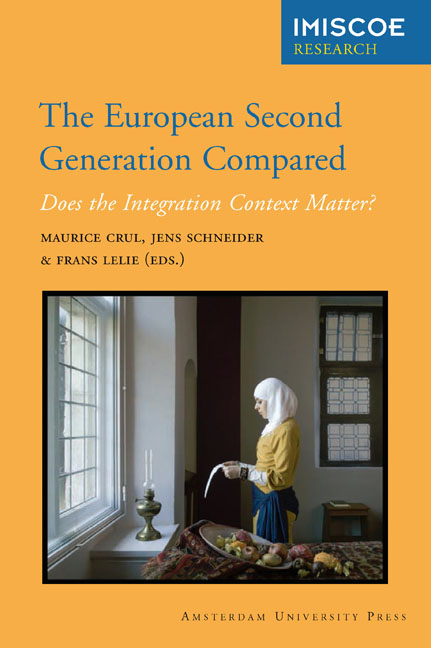Book contents
- Frontmatter
- Contents
- Acknowledgements
- 1 Introduction
- 2 Comparative Integration Context Theory: Participation and Belonging in Diverse European Cities
- 3 Research Methodology
- 4 The TIES Respondents and their Parents: Background Socio-Demographic Characteristics
- 5 School Careers Of Second-Generation Youth in Europe: Which Education Systems Provide the best Chances for Success?
- 6 Assessing the Labour Market Position and Its Determinants for the Second Generation
- 7 Union Formation and Partner Choice
- 8 Identities: Urban Belonging and Intercultural Relations
- 9 Ways of ‘being Muslim’: Religious Identities of Second-Generation Turks
- 10 Conclusions and Implications: The Integration Context Matters
- List of Contributors
- Other IMISCOE titles
6 - Assessing the Labour Market Position and Its Determinants for the Second Generation
Published online by Cambridge University Press: 09 January 2021
- Frontmatter
- Contents
- Acknowledgements
- 1 Introduction
- 2 Comparative Integration Context Theory: Participation and Belonging in Diverse European Cities
- 3 Research Methodology
- 4 The TIES Respondents and their Parents: Background Socio-Demographic Characteristics
- 5 School Careers Of Second-Generation Youth in Europe: Which Education Systems Provide the best Chances for Success?
- 6 Assessing the Labour Market Position and Its Determinants for the Second Generation
- 7 Union Formation and Partner Choice
- 8 Identities: Urban Belonging and Intercultural Relations
- 9 Ways of ‘being Muslim’: Religious Identities of Second-Generation Turks
- 10 Conclusions and Implications: The Integration Context Matters
- List of Contributors
- Other IMISCOE titles
Summary
Introduction
There is ample research evidence about the economic hardship that immigrants and their families face (see e.g. Kogan 2006; OECD 2007, 2008). The most predominant reasons for such hardship include the low starting position of unskilled and low-skilled migrants and, especially for more highly educated migrants, a lack of skills transferability upon migration. An evaluation of the second generation's position in the labour market gives insights into the extent to which labour market disadvantages found in the first generation are reproduced in the subsequent one. The labour market integration of the second generation, along with education, helps to determine the quality of structural integration processes. Our research seems to suggest that disadvantages are still present in the second generation, though this is mostly due to lower levels of human capital and lowerstatus social origins. Yet, there are also disadvantages unaccounted for by these factors that vary according to their specific context of integration.
A major goal of this chapter is to assess the level of labour market integration. We focus on second-generation Turkish respondents because, as a group, they offer the most generalisability for a cross-country comparison. Specifically, we focus on the extent to which they have reached parity with the comparison group vis-à-vis labour market features such as labour force participation, unemployment, occupational status and mobility. A comparison benchmark like this is important for examining in how far the second generation, as a whole, reaches various positions within the labour market and may move at a different pace from the comparison group. This allows us to measure, to a certain point, their level of labour market integration. Examining these differentials, we hone in on, as Heath and Cheung (2007) refers to them, possible ethnic premiums and ethnic penalties that remain once individual and human capital factors are taken into account. We look primarily at city-level differences since they comprise the aggregate level of our data. Beyond the comparison with respondents of native descent, we investigate the impact of individual, structural and institutional factors on the labour market outcomes for second-generation Turks across cities. We explore the effect of differences in institutional arrangements between cities, taking into account the impact of individual characteristics of the respondents.
- Type
- Chapter
- Information
- European Second Generation ComparedDoes the Integration Context Matter?, pp. 165 - 224Publisher: Amsterdam University PressPrint publication year: 2013



